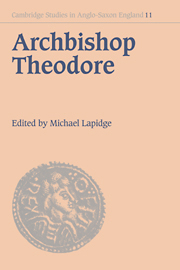Book contents
- Frontmatter
- Contents
- Preface
- List of abbreviations
- 1 The career of Archbishop Theodore
- 2 The Syriac background
- 3 Theodore of Tarsus and the Greek culture of his time
- 4 Rome in the seventh century
- 5 Theodore, the English church and the monothelete controversy
- 6 The importation of Mediterranean manuscripts into Theodore's England
- 7 Theodore and the Latin canon law
- 8 The Penitential of Theodore and the Iudicia Theodori
- 9 Theodore and the Passio S. Anastasii
- 10 Theodore and the Laterculus Malalianus
- 11 Theodore and the liturgy
- 12 Theodore's Bible: the Pentateuch
- 13 Theodore's Bible: the gospels
- 14 Theodore and Anglo-Latin octosyllabic verse
- 15 The Canterbury Bible glosses: facts and problems
- Index
7 - Theodore and the Latin canon law
Published online by Cambridge University Press: 03 May 2010
- Frontmatter
- Contents
- Preface
- List of abbreviations
- 1 The career of Archbishop Theodore
- 2 The Syriac background
- 3 Theodore of Tarsus and the Greek culture of his time
- 4 Rome in the seventh century
- 5 Theodore, the English church and the monothelete controversy
- 6 The importation of Mediterranean manuscripts into Theodore's England
- 7 Theodore and the Latin canon law
- 8 The Penitential of Theodore and the Iudicia Theodori
- 9 Theodore and the Passio S. Anastasii
- 10 Theodore and the Laterculus Malalianus
- 11 Theodore and the liturgy
- 12 Theodore's Bible: the Pentateuch
- 13 Theodore's Bible: the gospels
- 14 Theodore and Anglo-Latin octosyllabic verse
- 15 The Canterbury Bible glosses: facts and problems
- Index
Summary
When scholars first considered the canon law known to Archbishop Theodore, they could act with decision. The materials on which to form a view were slight and little understood, and the matter could be dismissed briefly. Since then the subject has been transformed, though good editions are still thin on the ground. The complexity of the problems is now clear, but correspondingly the answers are more elusive. The systematic study of the sources of canon law in England in the seventh and eighth centuries in the light of this learning is still in its infancy. Only the most preliminary of sketches can be attempted here.
What I have tried to do is to lay out the elements of the problem, to examine very briefly the bearing of the testimony of the Councils of Hertford and ‘Hatfiek’, the glossaries of Leiden and Paris and the Indicia Theodori on the question, and to end with a guess about the outcome of further work.
To begin with the context. Since the pioneering studies of Johnson and Bright, our knowledge of the scale and range of canonical study in the seventh century has been enlarged out of all recognition. One consequence is that we can see how various a world Theodore came from. Bede's account of the new archbishop's journey to England provides a convenient framework for defining some of its elements. As he made his way to England he passed through at least four distinct zones in the study of canonical texts.
- Type
- Chapter
- Information
- Archbishop TheodoreCommemorative Studies on his Life and Influence, pp. 120 - 140Publisher: Cambridge University PressPrint publication year: 1995
- 1
- Cited by



